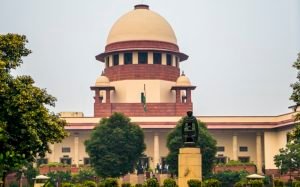The core issue revolved around whether officers from the Indian Administrative Service (IAS), such as District Collectors, could serve as “reporting authority,” “reviewing authority,” or “accepting authority” for IFS officers1. The impugned G.O. specifically directed that the Conservator or Chief Conservator of Forest, acting as reporting authorities, would seek a note from the District Collector for evaluating the performance of IFS officers. The applicants contended that this G.O. was in direct violation of earlier Supreme Court judgments.
Law Involved
The judgment primarily relied on:
- All-India Services Act, 1951 (AIS Act): Section 3(1), which empowers the Central Government to make rules for recruitment and conditions of service for All-India Services personnel.
- All-India Services (Confidential Rolls) Rules, 1970 (1970 Rules) and All-India Services (Performance Appraisal Report) Rules, 2007 (2007 Rules): These rules define “reporting authority,” “reviewing authority,” and “accepting authority,” typically requiring them to be superior in rank or grade to the officer being reported upon.
- Principles of Hierarchy and Supervision: Clause 4 of a clarification dated 28th December 1990 states that the reporting authority should be in a higher grade of pay than the officer reported upon, and the reviewing authority should be in a higher grade than the reporting authority.
- Previous Supreme Court Precedents:
State of Haryana v. P.C. Wadhwa, IPS, Inspector General of Police and Another: This case established the principle that a “reporting authority” must be a person higher in rank than the officer whose performance is being appraised.
Santosh Bharti v. State of Madhya Pradesh: This was a particularly relevant precedent directly concerning IFS officers in Madhya Pradesh. An order from this case, dated 22nd September 2000, clarified that the CRs of IFS officers must be written by their immediate superior officers within the Forest Department, and not by officers from other departments like the Revenue Department. The Central Empowered Committee (CEC) report in this case also recommended that IFS officers’ CRs should normally be written by superior forest officers.
State of Assam and Others v. Binod Kumar and Others: Reaffirmed the need for the reporting authority to be an immediate superior officer.
- Official Communications: Letters from the Ministry of Environment & Forests (MoEF) dated 8th November 2001 and Department of Personnel & Training (DoPT) dated 2nd September 2004, which provided instructions and clarifications regarding the writing of ACRs (now PARs) for IFS officers.
Reasoning
The Supreme Court’s reasoning was rooted in the strict interpretation of existing rules and adherence to its own precedents regarding administrative hierarchy and the integrity of performance appraisal systems:
- Violation of Prior Directions: The Court found the impugned G.O. of 29th June 2024 to be in “total violation” of its specific directions previously issued in the ongoing proceedings, particularly the order dated 22nd September 2000 in the Santosh Bharti case2021.
- Departmental Superiority Mandated: The established legal position, affirmed in Santosh Bharti, is that IFS officers’ performance reports must be written by their immediate superior officers within the Forest Department. The Court emphasised that the reporting authority must be “superior in rank and hierarchy” within the same service or department.
- Limited Role for External Input: While Collectors and Commissioners might record comments on IFS officers’ performance related to specific schemes (like the 20-point programme), these comments are meant to be on a separate sheet and do not empower them to be the official reporting, reviewing, or accepting authority for the overall PAR13…. The Court explicitly noted that the CEC’s recommendations in Santosh Bharti discouraged CRs for forest officers being written by Revenue Department counterparts.
- Maintaining Administrative Accountability: The Court highlighted that ignoring the defined role of superiors within the IFS channel for PARs would be inconsistent with principles of governance, accountability, and equity in public administration. Allowing officers from a different service (IAS) to directly report on IFS officers’ performance could undermine departmental autonomy and the established chain of command.
Holding
The Supreme Court allowed the applications.
- The impugned Government Order dated 29th June 2024 was consequently quashed and set aside.
- The State of Madhya Pradesh was directed to reframe its rules concerning the Performance Appraisal Reports of IFS officers.
- This reframing must be done by strictly adhering to the specific directions previously issued by the Supreme Court in its order dated 22nd September 2000 (in the Santosh Bharti case), as further clarified by the MoEF and DoPT communications1921.
In Re: Performance Appraisal Reports Of The Officers Of The Indian Forest Service
Supreme Court: 2025 INSC 748: (DoJ 21-05-2025)






